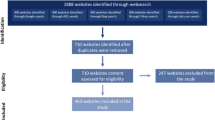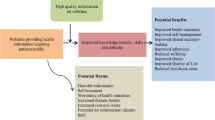Abstract
There is a paucity of literature that has evaluated the information quality of the current bariatric and obesity applications. Our objective was to evaluate the quality of currently available smartphone applications for bariatric-patient care using the Silberg scale. The two most widely used smartphone application online stores were searched in June 2014 and a total of 39 applications were evaluated. The average Silberg score of the 39 applications was 4.0 ± 1.76. The current gaps of information quality include the lack of provision of appropriate references, full disclosure of sponsorship, and accurate disclosure whether the application has been modified in the past month.

Similar content being viewed by others
References
Shields M, Carroll MD, Ogden CL. Adult obesity prevalence in Canada and the United States. NCSH data brief, number 56. Hyattsville: National Centre for Health Statistics; 2011.
Mitchell JE, Selzer F, Kalarchian MA, Devlin MJ, Strain GW, Elder KA,…Yanovski SZ. Psychopathology before surgery in the longitudinal assessment of bariatric surgery-3 (LABS-3) psychosocial study. Surgery for Obesity and Related Diseases. 2012;8:533–41.
Cassin SE, Sockalingam S, Wnuk S et al. Cognitive behavioural therapy for bariatric surgery patients: preliminary evidence for feasibility, acceptability and effectiveness. Cogn Behav Prac. 2013;20(4):529–43.
Hamid A, Kavit A. Smartphone applications for the urology trainee. BJU Int. 2011;2011(108):1371–5.
Mobile future. Social media, apps, and data growth headline 2010 mobile trends. 2010; URL: http://www.mobilefuture.org/content/pages/mobile_year_in_review_2010?/yearendvideo [accessed 2014-03-17]
Karl FBP, Heather W, Kim W. Smartphone and medical related app use among medical students and junior doctors in the United Kingdom (UK): a regional survey. BMC Med Inform Decis Mak. 2012;12:121.
Katie C, Richard RWB, Bruce T, et al. Smartphone applications (apps) for the bariatric surgeon. Obes Surg. 2013;2013(23):1669–72.
Daniel JS, John AJ, Noah H, et al. Obesity surgery smartphone apps: a review. Obes Surg. 2014;2014(24):32–6.
Faye H, Richard RWB, Simon M. Smartphone apps to support hospital prescribing and pharmacology education: a review of current provision. Br J Clin Pharmacol. 2013;77(1):31–8.
Eysenbach G, Powell J, Kuss O, et al. Empirical studies assessing the quality of health information for consumers on the World Wide Web: a systematic review. JAMA. 2002;287(20):2691–700.
Griffiths KM, Christensen H. Quality of web-based information on treatment of depression: a cross section survey. BMJ. 2000;321(7275):1511–5.
Eunjoo J, Hyeoun-Ae P, Yul HM, et al. Analysis of the information quality of Korean obesity-management smartphone applications. Health Informatics J. 2014;20(1):23–9.
Zermatten A, Khazaal Y, Coquard O, et al. Quality of web-based information on depression. Depress Anxiety. 2010;27(9):852–8.
Morel V, Chatton A, Cochand S, et al. Quality of web-based information on bipolar disorder. J Affect Disord. 2008;110(3):265–9.
Zhang M, Tsang T, Cheow E, et al. Enabling psychiatrists to be mobile phone app developers: insights into app development methodologies. JMIR mHealth uHealth. 2014;2(4), e53.
Aslani A, Pournik O, Abu-Hanna A, et al. Website evaluation tools: a case study in reproductive health information. Stud Health Technol Inform. 2014;205:895–9.
Acknowledgments
None
Authors’ Information
MWBZ is currently a Psychiatry Specialist Registrar with the National Healthcare Group, Singapore. He has a special interest in the application of technologies in advancing psychiatry. RCMH is an assistant professor and consultant psychiatrist with the Department of Psychological Medicine, Yong Loo Lin School of Medicine, National University of Singapore. He is the education director for undergraduate psychiatry education. RH and SS are bariatric psychiatrists with the University Health Network and the University of Toronto, Toronto
Author information
Authors and Affiliations
Corresponding author
Ethics declarations
This article does not contain any studies with human participants or animals performed by any of the authors.
Conflict of Interest
The authors declare that they have no competing interests.
Disclosures
One of the authors is the co-clinical director in a Level 1A bariatric surgery Centre of Excellence as per the American College of Surgeons. He works in an inter-professional bariatric surgery clinic and has published with surgeons on both psychosocial and surgical outcomes related to the procedure.
Informed Consent
Does not apply.
Rights and permissions
About this article
Cite this article
Zhang, M.W.B., Ho, R.C.M., Hawa, R. et al. Analysis of the Information Quality of Bariatric Surgery Smartphone Applications Using the Silberg Scale. OBES SURG 26, 163–168 (2016). https://doi.org/10.1007/s11695-015-1890-5
Published:
Issue Date:
DOI: https://doi.org/10.1007/s11695-015-1890-5




